5 Best (REALLY FREE) Antivirus Software for Windows in 2020

Short on time? Here’s the best free Windows antivirus for 2020:
- Panda: Exceptional antivirus scanning and protection. There are some nice extra features, and it comes with a free VPN!
There are only a handful of free Windows antivirus applications which actually offer decent PC protection.
And some free antiviruses are actually malware designed to steal your private information. This is especially true for Windows because, with so many users around the world, it’s the most popular target for viruses and other dangerous malware. That’s why it’s important that you don’t fall victim to one of these common scams and only download legitimate programs with a history of high-quality performance.
I’ve tested over 80 antivirus solutions to bring you these free Windows antiviruses that are better than the rest. While there is no such thing as a “free antivirus” with zero limitations, these 5 brands each offer a free plan which will help protect your PC. They are often pretty basic, but many are worth trying, and some are much better than Windows Defender — the default protection included with Windows.
Here’s a summary of best free Windows antiviruses for 2020:
- Panda: Overall #1 free antivirus for Windows for most users in 2020.
- Avira Powerful antivirus technology. Provides reliable anti-malware protection for most PC users.
- Sophos: The best free plan for families. Great interface with parental controls (up to 3 devices).
- Kaspersky: Helpful extras like a VPN, dark web monitoring, and a password manager.
- Bitdefender: Most simple free antivirus with low CPU load.
UPDATE (2020): One of the top antivirus providers, Norton, recently removed its free package, so I’ve removed it from this list. But Norton really is one of the best antivirus providers out there, so if you don’t want to deal with the hassles of free antivirus, a low-cost premium antivirus like Norton 360 is always a good choice.
Yes, You Already Have a Free Antivirus on Your PC, But it Isn’t Good Enough
Your Windows computer already comes with Windows Defender — which, as you can see from our recent review, is a decent free antivirus. But the problem with Windows Defender is that it doesn’t do enough for cybersecurity and online protection, and Microsoft rarely updates it. To keep your PC actually safe, you need the kind of protection that you can only get from dedicated antivirus software.
There are some impressive free antivirus applications out there — but remember that none of these free versions offer complete protection. It’s not totally safe to rely on the free version of a paid product.
These free versions don’t just limit special features. In fact, many brands reserve their highest level of security for paying users — Malwarebytes and TotalAV being a couple of these brands.
For example, advanced protection against ransomware is often a premium antivirus feature. Ransomware works by locking up your computer or personal files and demanding that you make a payment to release them. It’s risky to leave yourself open to this kind of serious attack, but a premium antivirus almost always includes guaranteed ransomware protection.
My number 1 free Windows antivirus application, Panda Free Antivirus, is particularly generous with its free offerings.
But the premium version of any one of these products will offer more security features than all the free versions combined.
How I Rated the Best Free Windows Antivirus Software:
While many brands offer something for free, there’s a huge difference in terms of quality and security. Most so-called “free antivirus programs” turn out to be just a virus scan — some programs will detect malware for free but demand payment to remove it. To earn a place in my top 5, a free Windows antivirus software must offer the following:
- Genuinely free. Brands usually try to trick you into staying with them by offering a free trial and then making you pay to keep using the product. I checked to make sure that each one of these programs was actually free and not just offering a “free trial”.
- No surprises. I don’t tolerate surprises when it comes to online security. Every antivirus here does what it says it does and doesn’t hide anything or mislead you into paying money.
- Strong protection. I can confidently say that each one of these free antivirus programs provides a relatively safe level of security for you and your devices.
- Excellent test results. There are fake antivirus programs out there, but I’ve personally tested each one of my top 5 on a wide variety of criteria and feel 100% safe in recommending them to you. For more info on how we test an antivirus, go here.
- Additional features. You’re not going to get the best a brand has to offer without paying for it. But I’ve given special consideration to brands that offer a few extra features at no extra cost.
Top Brands That Didn’t Make the Cut:
I’ve spent a long time compiling and revising this list to guarantee that I’m offering you a high quality resource. You may be surprised to see that some of the top antivirus brands didn’t make the top 5. Here are a few of them:
- Avast/AVG. While Avast — and their subsidiary antivirus company AVG — continue to offer a widely used free antivirus software, the recent controversy over their privacy violations means that we won’t be recommending them on SafetyDetectives anymore.
- ZoneAlarm. ZoneAlarm offers an enticing free firewall and antivirus software as separate downloads on their site. The firewall is great — it will keep you safe from digital intrusion and has tons of settings for more advanced users. However, their antivirus software didn’t impress me much, missing a significant amount of malware in my testing.
- Norton. It’s really a shame that they don’t even have a “free trial” of their Windows antivirus. But like I said earlier, Norton is still one of the best antiviruses in the world for protecting PCs, so if you’re looking for premium protection, Norton is likely the best option.
1. Panda Free Antivirus — Best Overall Free Windows Antivirus
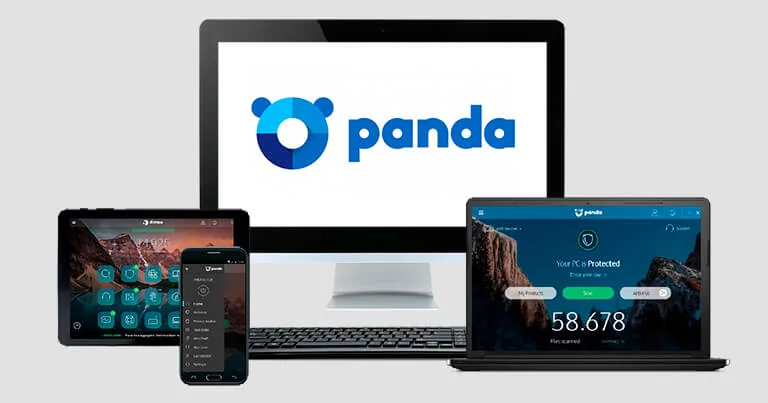
Panda Free Antivirus is lightweight, secure, and easy-to-use. Everything is laid out on the dashboard in an attractive and intuitive way. It’s great for beginners who don’t want to worry about a lot of advanced settings — just open it up and let it run.
Panda might be one of the lesser-known brands on this list, but its antivirus scanner scored exceptionally well in my tests, with a 100% virus detection rate. The included firewall is also pretty powerful, blocking more intrusions than any other free antivirus I tested, including the Windows firewall.
I really like that Panda Free Antivirus comes with a virtual private network (VPN). I always recommend using a VPN if you’re on a public Wi-Fi network — not only is all of your data exposed to the network administrator, unsecured Wi-Fi networks are notoriously easy to hack into. While Panda’s VPN is free, it has a data limit of 150 MB per day — this is good for browsing the web and sending emails, but it’s not nearly enough data for things like streaming or file sharing. You can only get unlimited VPN data on the Panda Dome Premium plan.
Overall, in terms of anti-malware protection, Panda is my favorite free antivirus of 2020.
Bottom Line:
Panda Free Antivirus is a powerful and easy-to-use antivirus, offering 100% free protection. It’s one of the most intuitive antivirus programs out there — no advanced setup required. The VPN is powerful, but it’s limited to 150 MB per day. If you want unlimited VPN access — and other extras like a password manager, parental controls, and advanced malware detection — you’ll need to upgrade. Otherwise, Panda offers a great free Windows antivirus.
2. Avira Free Antivirus — Best for Internet Security
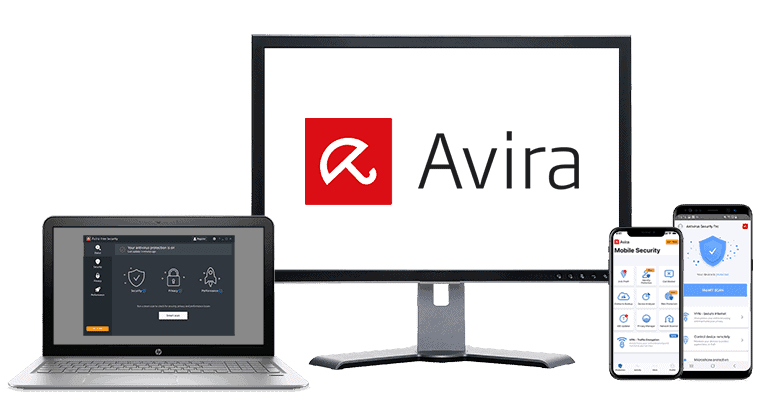
Avira Free Antivirus not only lets us experience Avira’s legendary German-engineered antivirus technology, it also includes Avira Browser Safety — an extension for Firefox and Chrome which protects against malicious websites and phishing scams.
Avira’s antivirus engine operates in the cloud, meaning that most of its malware detection and analysis doesn’t actually take place on your PC. This cloud-based technology has two main advantages.
First, it means Avira can keep its methods secret by only fighting malware on its own servers. This puts Avira one step ahead of the hackers at all times because hackers won’t know what Avira knows.
Second, it means Avira can maintain an extremely low “footprint” — it demands very few system resources. In fact, Avira has one of the smallest and lightest antivirus engines of all the major antivirus brands.
And because Avira runs so efficiently, even many older Windows PCs can run Avira Free Antivirus without much impact on performance. If your PC sometimes feels slow and sluggish when you’re using applications, Avria could be your antivirus solution.
Bottom Line:
If you’re looking for solid protection against malware and you don’t need any extra features, Avira Free Antivirus is a good choice. Avira is particularly lightweight, so your PC’s performance won’t suffer. And if you want access to Avira’s world-class privacy and security features on up to 5 devices, you can take advantage of this 40% discount on Avira Prime.
3. Sophos Home Free — Best for Parental Controls
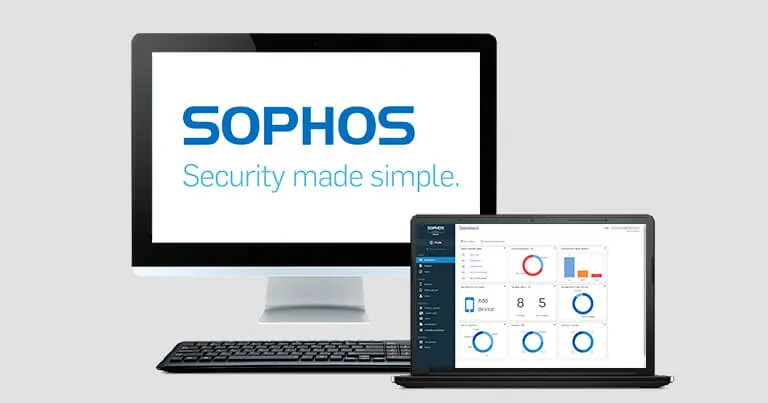
There’s plenty of bad stuff online that basic antivirus software won’t pick up. As well as protecting your devices and personal information from viruses, Sophos Home Free is a good free antivirus that helps protect your kids from the parts of the web that you might not want them to see.
Sophos Home Free includes great parental controls — something that usually comes only in premium internet security packages, such as Norton 360 Deluxe. Parental controls let us monitor how our kids use their devices and restrict which websites they can access.
Sophos Home Free also includes real-time protection against malware and a browser extension that keeps you away from visiting malicious websites.
You can install the free version of Sophos on up to 3 devices. This is very generous for a free product, but if you have more devices, you’ll need to upgrade — luckily, there’s a 20% off discount on Sophos Home Premium right here.
Bottom Line:
Sophos Home Free is a user-friendly, effective antivirus application — and the best free antivirus with parental controls. Larger families should consider Sophos Home Premium, which allows up to 10 users.
4. Kaspersky Security Cloud (Free) — Best for Added Features
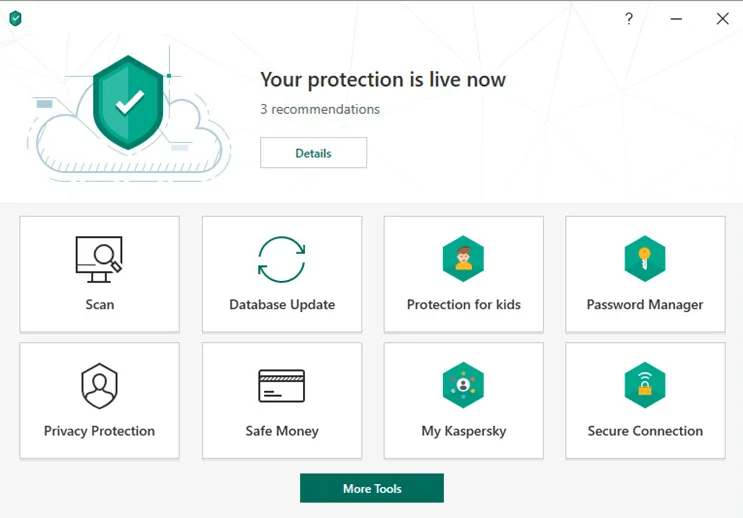
Kaspersky Security Cloud — Free is an impressive free antivirus suite. It includes Kaspersky’s cloud-based malware scanning engine, which caught 100% of the threats I threw at it during testing.
Not only does Security Cloud scan for malware, perform system cleanup and use active scanning to prevent new threats, but it also provides complete privacy protection with a VPN, a password manager, and dark web scanning.
The VPN is pretty good — it didn’t slow my computer down very much, and allowed me to unblock geo-restricted streaming content with servers around the globe. Unfortunately, there is a 200 MB daily limit, but that’s better than the 150 MB daily data on Panda’s free VPN.
The limit on the password manager is a little bit worse — only 15 separate logins can be saved, which is not nearly enough for most users. Still, if you have 15 logins which are your highest priority, the password manager generates and auto-fills extremely complex passwords for an added layer of security.
The dark web scanner is simple, but effective. After I gave it my essential logins, it regularly checked the database at Have I Been Pwned to see if my information was getting shared around the dark web.
Bottom Line:
Kaspersky Security Cloud — Free is a powerful free antivirus suite with some cool extra features. The VPN and password manager work really well, but the usage limits on them make them less useful than standalone products. However, considering that you’re getting an antivirus suite for free, along with these useful extras, I’d recommend heading over to Kaspersky and giving this free program a shot.
5. Bitdefender Antivirus Free — Best for Simple Windows Protection
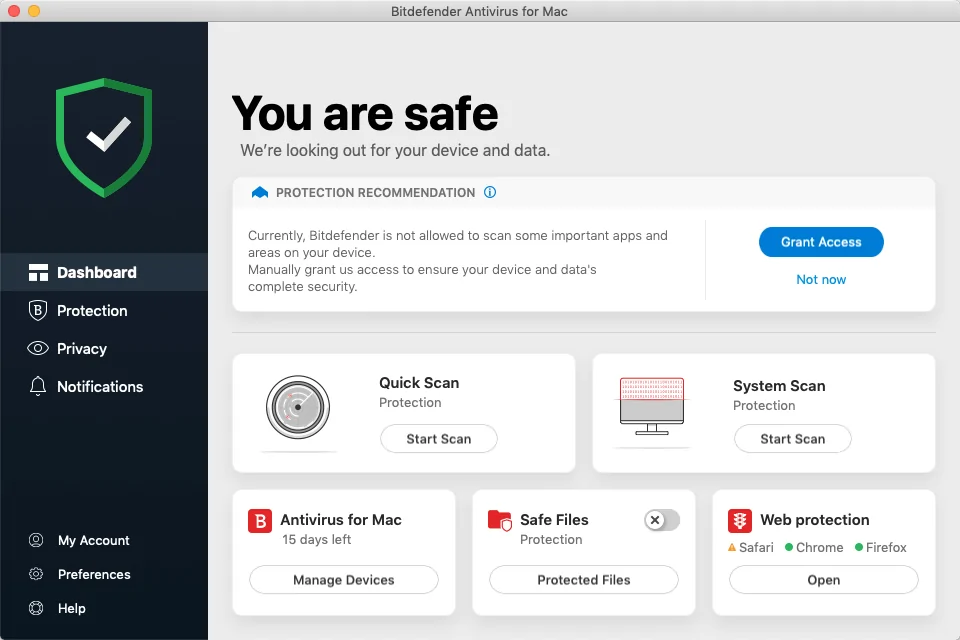
Bitdefender’s Antivirus Free is a great choice for users looking for an antivirus scanner that they don’t need to think about after installation. Bitdefender is designed to run in the background, with only essential notifications in case of suspicious program activity. Malware scans, detection, and removal all happen automatically, unless you decide to adjust the settings.
If you’re looking for extra features like a password manager, parental controls, dark web monitoring, or a VPN, this is not the right product for you (you’ll need something like Norton 360 for that). However, it’s still really good antivirus software, and its minimal design means that it won’t slow your PC down at all.
As we saw in our full review, Bitdefender’s malware scanner is one of the strongest on the market, and the Advanced Protection feature now extends to ransomware detection — any suspicious behavior on your PC will get frozen immediately. This scanner is really fast — malware files and ransomware processes were all caught just moments after I downloaded or unzipped them.
The anti-phishing and fraud protection features are pretty good as well. Bitdefender flagged all of the latest known phishing sites and alerted me when I was asked to enter private data onto 3 different suspicious web forms.
Bottom Line:
Bitdefender Antivirus Free doesn’t include as many extra features as other free antivirus software on this list, but it is one of the easiest to use. If you’re looking for 100% malware detection that runs in the background, keeps your computer safe, and monitors browsing, Bitdefender is a good choice.
Antiviruses for Windows — Frequently Asked Questions
- What’s the catch with free antiviruses?
- Why should I use a free antivirus instead of Windows Defender?
- What are the most common types of viruses that affect Windows computers?
- Will Windows allow me to install a free antivirus?
❓ What’s the catch with free antiviruses?
There is no such thing as a truly free antivirus. You always “pay” with something. Most antivirus companies offer premium versions of their apps and limit the free version to only offer basic protection. This leaves a lot of holes in your computer’s cybersecurity defense. The company hopes you’ll recognize you’re not well-protected, and they’ll try to get you to upgrade to the paid plan by sending you a ton of notifications and advertisements.
Some other antivirus companies even sell free users’ data to large corporations for marketing purposes.
If you’re only using your device for simple online browsing or word processing, you’re probably fine with a free antivirus. But, in general, if you have any kind of sensitive information being stored or entered on your Windows device, it’s always better to invest in a high-quality (low-cost) premium antivirus than it is to trust a free antivirus.
🤔 Why should I use another free antivirus instead of Windows Defender?
Windows Defender is a great product for basic needs. It detects and protects against viruses pretty well, and the included Windows Firewall is pretty good. But it doesn’t offer protection against other cyber threats like ransomware or phishing scams.
Many free antiviruses, like Avira, not only protect against these threats, but they are on the front lines of cybersecurity.
😈 What are the most common types of viruses that affect Windows computers?
Trojans are usually the go-to viruses for hackers looking to infect or steal your personal data. These are viruses that look like other files with extensions like .exe and .doc. But once downloaded, if you don’t have an antivirus installed on your PC, you will be running a serious virus that could debilitate your machine and potentially send all of your information to a hacker. A good antivirus will stop you from running that virus on your PC. An even better antivirus will stop you from downloading that virus in the first place.
That said, there are potentially millions of new and dangerous threats for Windows, so it’s crucial that your virus protection is updated with the latest known malware database.
🛡️ Will Windows allow me to install a free antivirus?
Absolutely! In fact, I recommend you choose Panda as a secure way of protecting your PC for free.
But if you’re looking for advanced protection and a lot of other great cybersecurity features, check out the list of the best premium antivirus products on the market.








